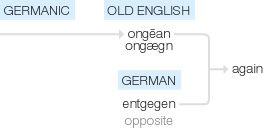Again
Old English ongēan, ongægn, etc., of Germanic origin; related to German entgegen ‘opposite’.
wiktionary
From Middle English agayn, again, ayain, ayen, anȝen, from Old English āġēan, onġēan, onġeġn(“towards, against, opposite to, contrary to, against, in exchange for, opposite, back, again, anew, also”). Cognate with Danish igen(“again”), Swedish igen(“again”), and Norwegian igjen(“again”)
etymonline
again (adv.)
late Old English agan, from earlier ongean (prep.) "toward; opposite, against, contrary to; in exchange for," as an adverb "in the opposite direction, back, to or toward a former place or position," from on "on" (see on (prep.) and compare a- (1)) + -gegn "against, toward," from Germanic root *gagina (source also of Old Norse gegn "straight, direct;" Danish igen "against;" Old Frisian jen, Old High German gegin, German gegen "against, toward," entgegen "against, in opposition to")
In Old English, eft (see eftsoons) was the main word for "again," but this often was strengthened by ongean, which became the principal word by 13c. Norse influence is responsible for the hard -g-. Differentiated from against (q.v.) 16c. in southern writers, again becoming an adverb only, and against taking over as preposition and conjunction, but again clung to all senses in northern and Scottish dialect (where against was not adopted). Of action, "in return," early 13c.; of action or fact, "once more," late 14c.
